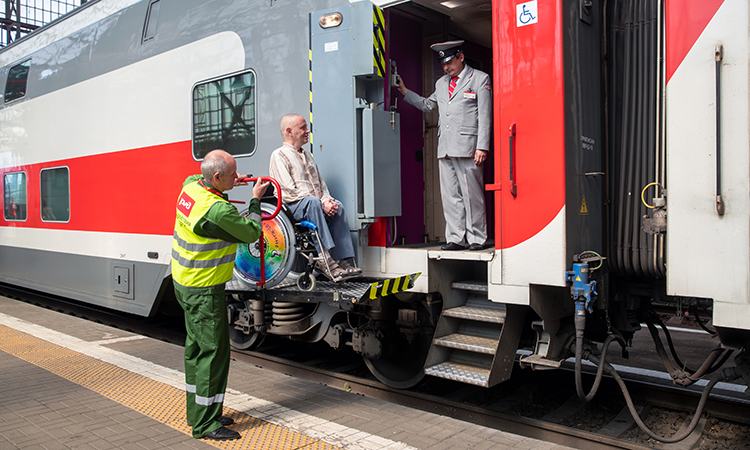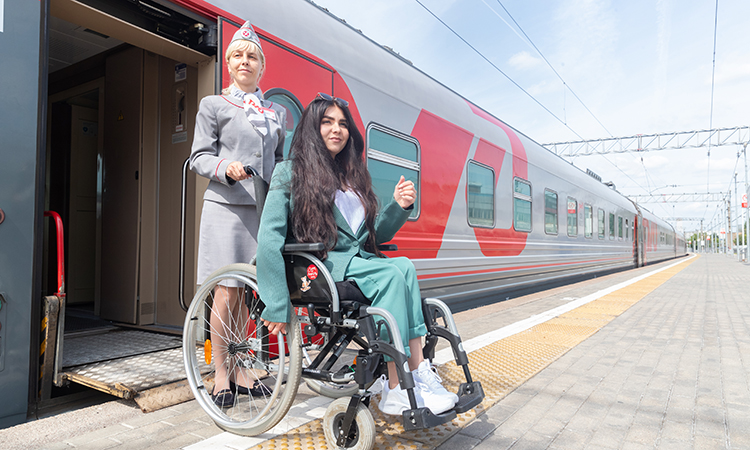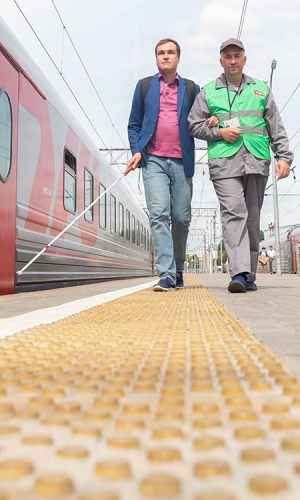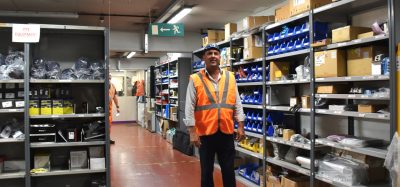Accessible rail transport is an important step for creating an inclusive society
Posted: 5 May 2021 | Dmitry Pegov | No comments yet
Disability should not be a barrier to rail travel. Dmitry Pegov, Deputy Managing Director of Passenger Services at Russian Railways (RZD), reveals their plans to provide a high level of service to all passengers with reduced mobility at all stages of their journey.


Credit: Russian Railways
Russian Railways (RZD) pays particular attention to creating an accessible environment at railway transport facilities for passengers with disabilities. The case is not just about following regulatory requirements or adhering to the dictates of the times. There is a necessity: we want to help those with reduced mobility become fully mobile. Today, it is possible. Accessible transport makes it easier to visit many sites, such as educational, cultural and health care institutions. That is, accessible transport is an important step towards creating an inclusive society, an element influencing the provision of conditions for the normal life of people with disabilities.
Accessible transport is an important step towards creating an inclusive society, an element influencing the provision of conditions for the normal life of people with disabilities.”
For able bodied people, it is often difficult to understand all the needs of a disabled person. Therefore, when creating a barrier-free environment for railway facilities, we pay attention to the suggestions and opinions of passengers with disabilities. On a permanent basis, there is a working group that ensures the availability of rail transportation for passengers with reduced mobility (PRMs). The group includes representatives of all Russian public associations of people with disabilities. The working group is a collegial body, it has the powers to objectively consider emerging issues, develop service standards and measures for RZD to ensure the accessibility of railway transport.
In addition, our company has a hotline (phone and online) where anyone can turn for assistance. This is another important source to get comments and suggestions from passengers, including those with disabilities. We carefully study each request and make improvements to our work.
Key initiatives that we are implementing are focused on the main stages in a rail passenger’s journey: before, during and after the trip.
The system of measures formed at the above stages makes it possible to ensure:
- Information about the available services
- The possibility to plan a trip in advance and choose the most convenient routes
- Necessary assistance and escort services at railway stations, stopping points and along the route
- An option to provide feedback on the quality of the trip, in order to develop optimal solutions to increase the level of customer satisfaction with railway transport services.


Credit: Russian Railways
RZD is in the process of developing a modern corporate culture of servicing PRMs. We carry out this work within the framework of the existing personnel training system. All employees related to servicing this category of passengers (there are more than 50,000 such employees) have been trained on issues related to ensuring accessibility.
Mobility Assistance Centre
Our Mobility Assistance Centre at Russian Railways (MAC Russian Railways) aims to provide information and services to passengers who experience difficulties when travelling independently.
MAC Russian Railways is a one-of-a-kind project; its test site covers the entire territory of Russia. More than 200,000 PRMs use its services annually.
Our Mobility Assistance Centre at Russian Railways (MAC Russian Railways) aims to provide information and services to passengers who experience difficulties when travelling independently.”
Upon request – made at the MAC at Russian Railways (this can be done by phone, by e-mail or on our official website) – a PRM will be met at the station, provided with a parking space, escorted through the main functional areas and assisted with boarding and disembarking on the train and moving luggage. A wheelchair or stretcher will be provided if needed.
The company is working to create a high level of service and, today, escort and assistance services for disabled passengers with musculoskeletal disorders or hearing or vision impairments are provided at more than 9,000 railway stations and stopping points in the country.
Our Call Centre operates 24/7. RZD’s official website has a special section, ‘For the Disabled’, with information to get acquainted with the services provided to passengers of this category and the conditions for their provision. The website allows users to check the availability of seats for disabled people on the train and learn the procedure for purchasing tickets for these seats.
Passenger infrastructure
Russian railway transportation has a rich history, and many of our stations are historical landmarks built before there were any requirements for accessibility. In order to comply with modern regulations, it is necessary to reconstruct and, in some cases, restore railway station buildings. In order to do this effectively, we need to hear from public advocacy groups for persons with disabilities.


Credit: Russian Railways
For passengers with visual and hearing impairments, all necessary audio and visual information is presented using special tools. Braille is used to communicate information to people with visual impairments.
The ‘Russian Railways for Passengers’ mobile app features a ‘Navigation’ mode for major train stations. It reads out data from special beacons and shows the user’s location on a map, allowing them to set a wheelchair-accessible route. A ‘Guide’ mode is under development, which will lead passengers to their destination, giving voice prompts on where to turn, which is of great help for passengers with visual impairments.
In 2020, we launched a pilot video-information centre at railway stations in Moscow, allowing passengers to call an operator and ask any questions that they may have about their trip using a video terminal. The operator will tell them everything that they need to know (in Russian sign language, if necessary). Sign-language interpreters will be on duty from 08:00 to 20:00, and we plan to extend this service to all major railway stations throughout the country.
Trains
The station is just where the journey begins, and all passengers expect the train to have the same levels of comfort. Long-distance trains feature larger compartments, wheelchair-accessible bathrooms and a wheelchair lift. The number of these wagons is constantly growing as we modernise our fleet: today, there is a total of 1,128.
High-speed (Sapsan and Allegro) and higher-speed trains (Lastochka and Strizh) are all accessible to passengers with disabilities, and there are discounts on tickets for travellers with disabilities and their attendants.
As a socially oriented company, RZD strives to make rail travel comfortable and affordable for all passengers, taking into account their individual needs, ensuring the necessary level of comfort throughout the trip and guaranteeing the safety of rail transportation.


Related topics
Passenger Experience/Satisfaction, Passengers With Reduced Mobility (PRM), Rolling Stock Orders/Developments, Safety, Station Developments, The Workforce, Training & Development








